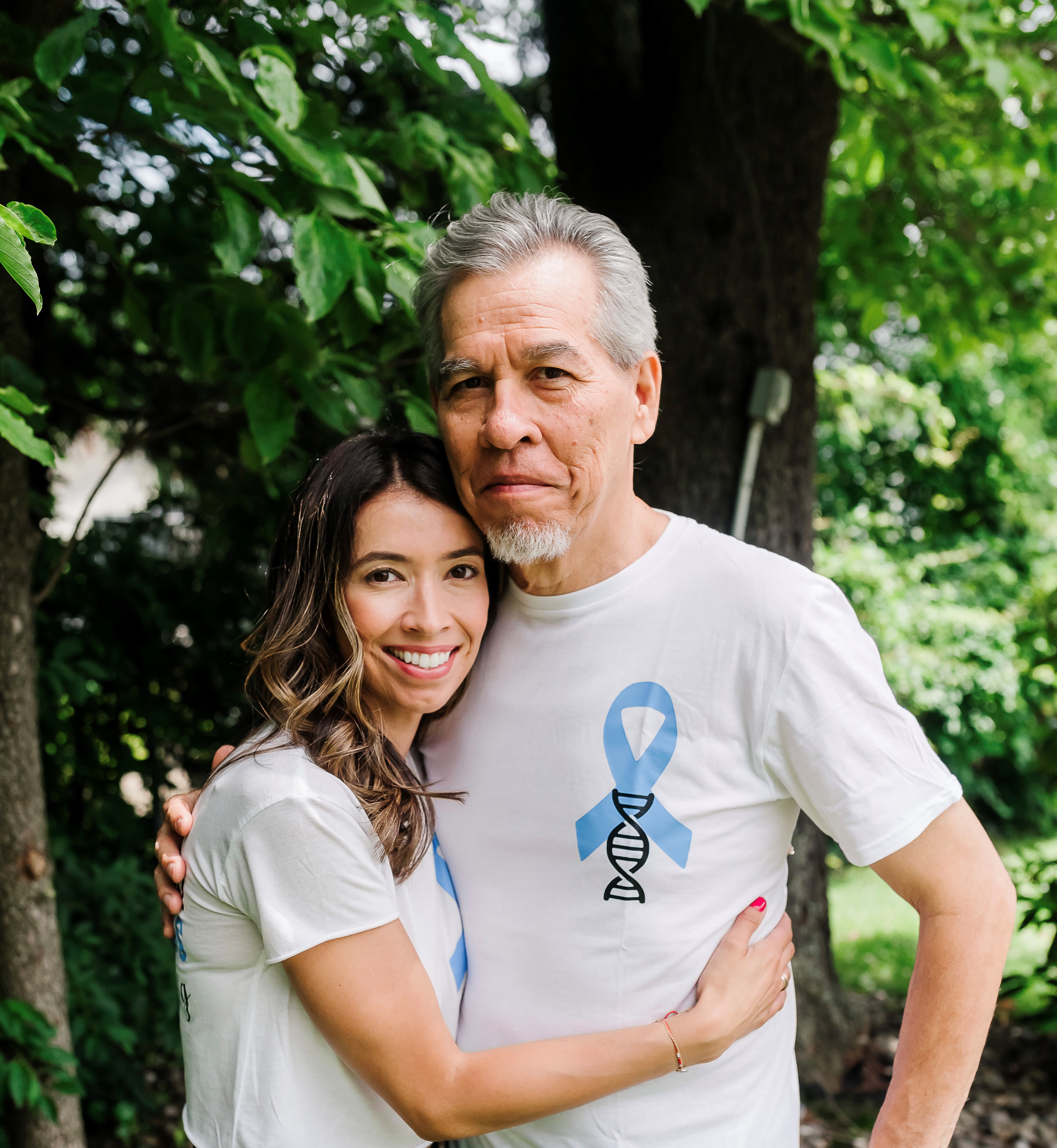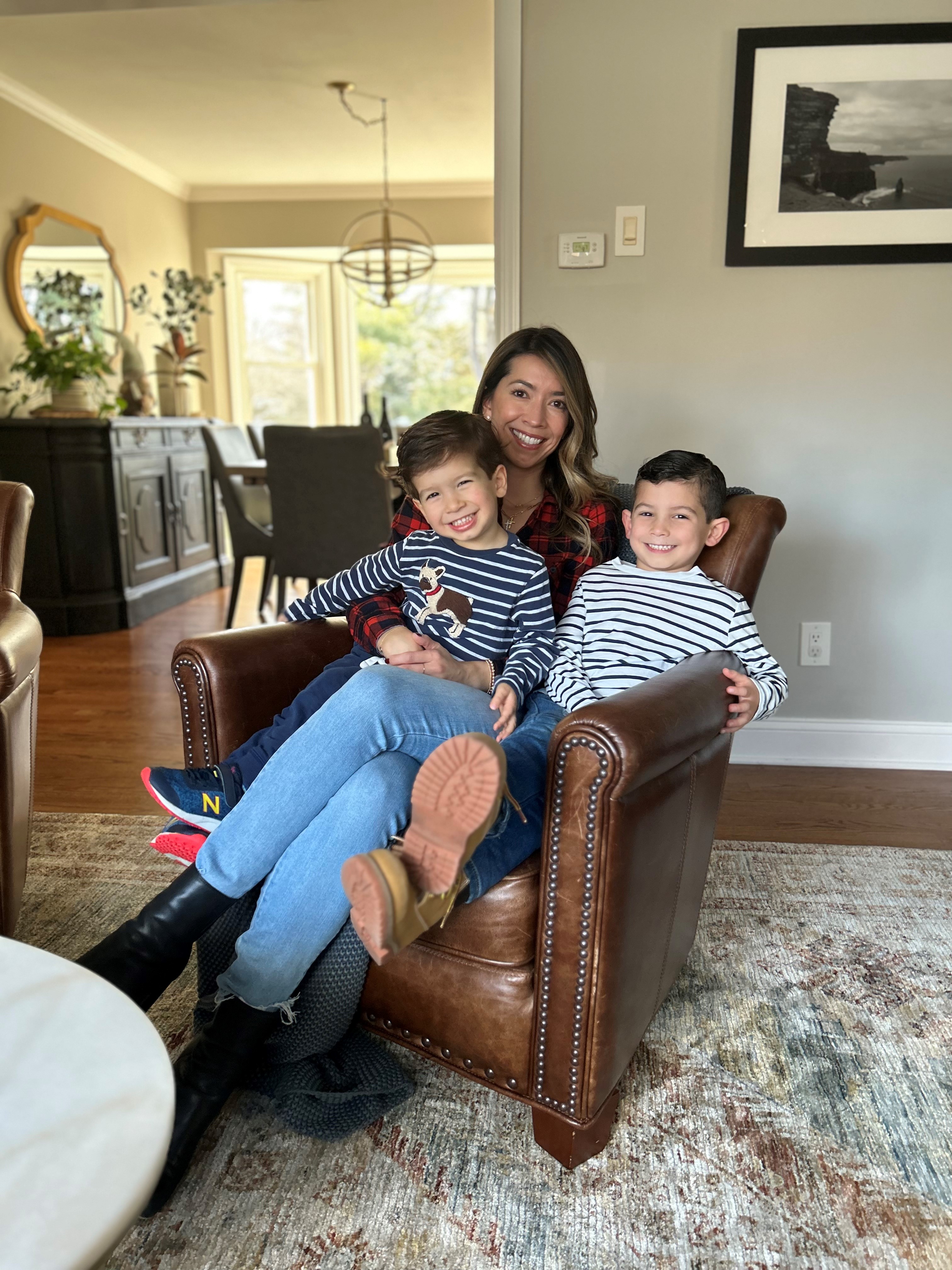It has been almost 3 years since my father was offered genetic testing after developing three different types of cancers. He also had an alarming family history – multiple relatives with cancer, going back generations. After he received a positive result for Lynch Syndrome, putting him at an increased risk for colon cancer and other types of cancers, he was told that there was a 50% chance for each of his children to have this genetic condition as well. My siblings and I had genetic testing through Ambry’s family testing program which uncovered that 3 of the 4 of us were positive for Lynch Syndrome. I shared the beginning of our story in 2022.
 The last few years have been transformative for our family. My father is doing well, and because of the information he has about his health, he has been taking a proactive and organized approach to his care. He likes to say that he is “on guard and aware.” Because of his perspective and experience, he is more apt to take action when concerning symptoms first arise. As an example, during his annual physical with his urologist, he discovered that he has a slow-growing prostate cancer. His provider has been very helpful in navigating the treatment plan, informed by his Lynch syndrome diagnosis. Last year, as my father continued to be focused on his health and prevention, he scheduled an appointment with a cardiologist. After his stress test, he discovered he had blocked arteries requiring bypass surgery. He is doing great today and continues to make proactive healthcare a priority. In addition to his own health, he consistently advocates for genetic testing for those at increased risk.
The last few years have been transformative for our family. My father is doing well, and because of the information he has about his health, he has been taking a proactive and organized approach to his care. He likes to say that he is “on guard and aware.” Because of his perspective and experience, he is more apt to take action when concerning symptoms first arise. As an example, during his annual physical with his urologist, he discovered that he has a slow-growing prostate cancer. His provider has been very helpful in navigating the treatment plan, informed by his Lynch syndrome diagnosis. Last year, as my father continued to be focused on his health and prevention, he scheduled an appointment with a cardiologist. After his stress test, he discovered he had blocked arteries requiring bypass surgery. He is doing great today and continues to make proactive healthcare a priority. In addition to his own health, he consistently advocates for genetic testing for those at increased risk.
Over the last few years, I have also revamped my healthcare team to ensure that I stay on top of my screenings, and I partner with providers who recognize the importance of identifying and managing hereditary cancer conditions. One important thing that I have learned is that it is ok to “break up” with a provider and find someone who truly listens OR who truly hears you. There have been a few appointments where I felt like the provider was hesitant when it comes to my hereditary cancer predisposition. It is critical to me that I have a team of health care providers that understand Lynch Syndrome and can best support me as we handle it together.
The sadness that comes with losing loved ones to cancer has not gone away. In fact, I recently lost another family member to cancer, which immediately brought some fear into my mind. The health screenings both for family members and myself often come with little and big waves of worry and angst. The scary question of whether my boys will inherit this genetic variant from me comes and goes. I understand why someone would choose not to find this information out. I’ve been there! It can be scary. My sister and I were talking about this after a recent loss in the family. She said to me, “It’s hard when you feel like your family is going down like dominos. Especially when it’s people in your age range. While it feels like this monster is coming for me, it’s also a big wake up call to think, ‘How can I be as armed as possible?’”
W henever I speak to someone who is on the fence about moving forward with genetic testing, one question I always ask is, “What is the alternative?” I’ve had people tell me they would rather not know because ignorance is bliss. I hope that with better awareness and education, more people will realize the alternative to not knowing is potentially receiving a cancer diagnosis that could have been prevented. I attribute the loss of some family members to a lack of awareness and professional guidance as it pertains to our family history. When it comes to colon cancer awareness, one thing I want people to take away from this blog is that colon cancer can be preventable. If polyps are found during a screening colonoscopy, the doctor may be able to remove them before they can progress into cancer.
henever I speak to someone who is on the fence about moving forward with genetic testing, one question I always ask is, “What is the alternative?” I’ve had people tell me they would rather not know because ignorance is bliss. I hope that with better awareness and education, more people will realize the alternative to not knowing is potentially receiving a cancer diagnosis that could have been prevented. I attribute the loss of some family members to a lack of awareness and professional guidance as it pertains to our family history. When it comes to colon cancer awareness, one thing I want people to take away from this blog is that colon cancer can be preventable. If polyps are found during a screening colonoscopy, the doctor may be able to remove them before they can progress into cancer.
I feel very grateful to have the knowledge that I do. This knowledge has been transformational for my health, the health of my loved ones and the health of future generations of our family. I hope that through telling my story, others become inspired to advocate and participate in their own healthcare. Knowledge truly is power. I hope anyone who is an appropriate candidate for genetic testing and is on the fence can shift their perspective from being afraid to know to instead embracing it as valuable, life-changing and empowering information.
• Ask your relatives about your family history. For tips, check out this blog.
• Talk openly with your healthcare providers about your medical and family history. If you don’t feel like you’re taken seriously, it’s time to find another team.
• If you have concerns about recommended or upcoming screening procedures, ask for more information. For instance, check out this resource on what to expect before and during a colonoscopy.
• If you or your healthcare provider have concerns about your hereditary risk, consider seeing a genetic counselor. You can find a genetic counselor to see in-person or by telehealth here.
• Genetic testing is just one important part of proactive health care. Work with your healthcare team to develop the proactive healthcare plan that is right for you.
• There is much we cannot control, but it can help to make healthy choices where you can. For me, that’s working on mindfulness, nutrition and movement.
• Find your why. I am passionate about awareness and access to hereditary cancer testing and appropriate cancer screening. I have remained active in raising colon cancer awareness in my community through fitness fundraisers, social media, supporting local health systems’ events and most importantly through connection. I welcome the opportunity to connect with others about my story and theirs.



